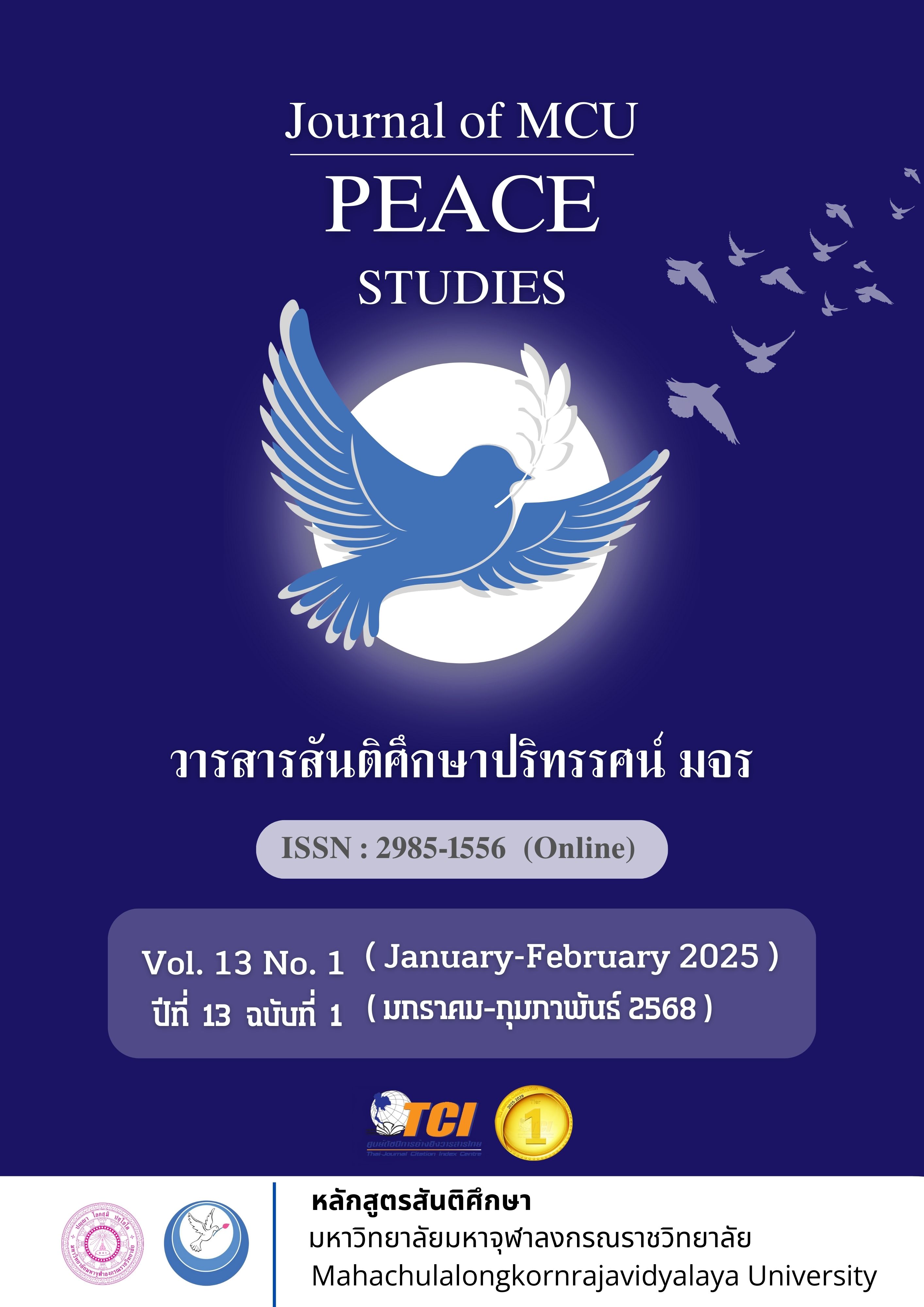The Process of Building a Peaceful Family under the Bowon Power by Buddhist Peaceful Means
Main Article Content
Abstract
The study had the following objectives: 1) to investigate the context, problems, causes, and needs for a peaceful family in the Bang Khun Non district, as well as the theories related to the process of building a peaceful family under Bowon power using Buddhist peaceful means; 2) to explore the Buddhadhamma that supports the process of building a peaceful family under Bowon power using Buddhist peaceful means; and 3) to present the process of building a peaceful family under Bowon power using Buddhist peaceful means. The study employed an action research method based on the Ariyasacca (Four Noble Truths) model with a 9-ladder approach to research methods. Data were collected through in-depth interviews with three groups: 1) 22 participants from the Wat Mai (Yai Paen) community; 2) 16 experts; and 3) a focus group discussion with 6 participants.
From the study, the following results were found: 1) Problems of coexistence among families in the Wat Mai (Yai Paen) community are caused by economic status, lack of morality, honesty, and awareness of one's roles, leading to mental and physical effects, and ultimately resulting in family separation. 2) The Buddhist peaceful means that support the process of building a peaceful family include Gharāvāsadhamma (four virtues for a good household life), namely sacca (truth and honesty), tama (self-development), khanti (tolerance), and cāga (generosity). These virtues enable spouses in families to overcome problems and obstacles, learn to forgive, and train themselves to control their minds while being aware of each one’s surroundings. 3) The process of building a peaceful family is achieved through five activities, leading to a new body of knowledge titled the ‘Happy Family Model.’ The model consists of five aspects: (1) being attentive, sacrificing, maintaining a positive mindset, and being considerate of one another; (2) being open, having a stable mentality, walking the talk, being affectionate, and taking care of one’s feelings; (3) understanding, being tolerant of temptation, and finding solutions to life’s problems; (4) fostering positive relationships and being considerate of one another; and (5) engaging in happy learning activities, which can lead to a covenant for building a strong family, helping one another throughout family life, and resulting in sustainable peace and happiness.
Article Details

This work is licensed under a Creative Commons Attribution-NonCommercial-NoDerivatives 4.0 International License.
Views and opinions expressed in the articles published by The Journal of MCU Peace Studies, are of responsibility by such authors but not the editors and do not necessarily reflect those of the editors.
References
Chimvilaisup, A. (2016). The Sustainable Development of Thai Community: Ban Doi Chang Case Study. Rangsit University. Pathum Thani.
Chuimanee, S. (2017). A Study of Application of Four Garavasadhammas for the Householder of Spouse. (Master’s Thesis). Mahachulalongkornrajavidyalaya University. Ayutthaya.
Duangkhieo, T. (2023). Wat Mai Community Secretary (Yai Paen). Interview. April, 29.
Eoseewong, N. (2002). Before the Sri Ariya Era: Regarding Religion Beliefs and Morals. Bangkok: Matichon.
Kanlayapatthanakul, W. et al. (2021). Buddhist Principles and Principles to Strengthen Family Security in Accordance with Buddhism. Journal of MCU Peace Studies, 9(1), 84-94.
Lucknowanich, S. (2011). Personal Relationship, Living Behaviors, and Academic Achievement of University Students in the Private Residence, Rangsit Area, Pathumthani. Bangkok: Bangkok University.
Mahachulalongkornrajavidyalaya University. (1996). Thai Tripitakas. Bangkok: MCU Press.
McClelland, D. C. (1970). Test for Competence Rather than Intelligence. American Psychologists, 1(3), 57-83.
Office of the National Economic and Social Development Board. (2017). The Twelfth National Economic and Social Development Plan (2017-2021). Bangkok: Office of the Prime Minister.
Phra Brahmapundit (Prayoon Dhammcitto). (2019). Sustainable Development Goals (SDGs). Bangkok: Amarin Printing and Publishing Public Company Limited.
Phra Phromkhunaporn (P.A. Payutto). (2000). Family Happiness Is the Peace of Society. (2nd ed.). Bangkok: Thammasapa.
Phramaha Hansa Dhammahaso. (2011). Buddhist Peaceful Means. Bangkok: 21st Century Co., Ltd.
Prabkraisi, T. (2023). Kham Government Teacher Level 7. Interview. April, 25.
Rạksap̣hạkdee, J. (2001). A Study of Married Couple's Morality according to the Buddhist Ethics. (Master’s Thesis). Thammasat University. Bangkok.
Rasamithammachote, S. (2005). Guidelines for Developing Human Potential by Competency Based Learning. (2nd ed.). Bangkok: Sirivatana Interprint Public Company Limited.
Rawạngngan, S. (2010). Causal Relationships of Big Five Personality Factors on Relationship Satisfaction of Dating Couples with Components of Love as Mediators. (Master’s Thesis). Chulalongkorn University. Bangkok.
Sirisit, K. (2023). Private Company Employee. Interview. April, 24.
Siriwanbut, P. (1997). Family Psychology. Bangkok: Chulalongkorn University Printing House.
Srithongsuk, K. (2016). The Moderating Effect of Internal Locus of Control on the Relationships among Perceived Organizational Support Peer Relationship and Happiness at Work. (Master’s Thesis). Thammasat University. Bangkok.
Thaokotsri, S. (2023). Private Company Employee. Interview. April, 26.
The Bureau of Registration Administration. (2015). Divorce. Retrieved July 5, 2023, from https://www.bora.dopa.go.th/CallCenter1548/index.php/menu-general/12-service-han d%20book%20/general/28-general-status-divorce
Themomentum. (2017). Divorce Doesn't Mean Failure Changing Perspectives on Divorce in Thai Society. Retrieved July 5, 2017, from https://themomentum.co/momentum-feature-divorce-not-fail/
Wasi, P. (1996). Buddhism and the Spirit of Thai Society, Research Issues on Religion and Culture. Bangkok: Mahachulalongkornrajavidyalaya University.
Wattanaphanit, K. (2023). Private Company Employee. Interview. April, 25.
Yoomonthien, P. (1994). When Dharma Protects the World of Buddhadasa Bhikkhu, Abbreviated Version. Bangkok: Sukkhapabjai.


